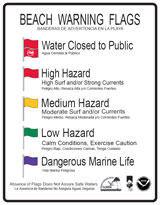Summer is upon us and that means many of us will be enjoying pools, lakes, rivers, and the ocean. Florida provides many opportunities for outdoor water recreation that we should enjoy responsibly and safely. Are you prepared to handle a water emergency? Do you have water safety rules? Do you know CPR? These are all things to consider. Not everyone is ‘waterproof’ and taking precautions can really prevent a misfortune.
As the warm summer months draw many of us to the water for fun and fellowship, remember, sudden things are sudden and people drown quickly and quietly. Being honest about your swimming abilities is important. If you are not a strong swimmer, chances are you will not be able to help someone in trouble. This is also important if you are supervising others. Take the time to work on your swimming skills with others or take lessons. Knowing basic cardiopulmonary resuscitation, CPR, also can increase the chances of survival for a drowning victim.
There is safety in numbers; enlist another adult to help when supervising swimming children. If you are at a public beach, river, or lake, locate the lifeguard and position yourself close to the stand. If the beach is the locale for the day, look for the flag to alert you to the surf conditions and adhere to the recommendations of the flag and signage. If you are at a venue with no lifeguard on duty, you are now the lifeguard! Locate any emergency devices available to you and be certain you have cell phone reception in case you must call for help. Have those you are supervising demonstrate their swimming abilities. Knowledge of someone’s swimming abilities in advance can allow you to set safer boundaries. For example, if a child cannot swim the width of the pool without stopping and placing their feet on the bottom, you have determined, for their safety, they must remain in the shallow area of the pool where they can stand up. Another great option is to have the children utilize swimming vests. Never allow for rough play in the water. What seems to be harmless quickly can become life- threatening.
No matter the venue, ocean, river, lake, or pool, be steadfast in monitoring the swimmers and prepared to assist if you are needed. The American Red Cross and National Swimming Pool Foundation have an online course to educate pool owners. The American Heart Association provides the option of taking an online CPR course. Being prepared for a potential crisis is the first step to avoiding a crisis. Many wishes for a safe summer of water fun!
- Celebrate World Heart Day - September 5, 2025
- Summer Beach Fun Includes Beach Safety - June 24, 2024
- Lifestyle and Brain Health - April 19, 2024

